Social Responsibility of Business: Theories, and Case Study Analysis
VerifiedAdded on 2023/01/06
|9
|2414
|20
Report
AI Summary
This report provides a comprehensive analysis of social responsibility in business, emphasizing its crucial role in enhancing brand image, reputation, and market value. It begins with an introduction to the concept and its importance in the global marketplace, followed by an in-depth exploration of the significance of Corporate Social Responsibility (CSR) in business. The report highlights how CSR contributes to a positive brand image and customer loyalty, as well as different CSR theories. The main body delves into the analysis of social responsibility, emphasizing its role in increasing profits, gaining a competitive advantage, and contributing to social goals. It examines the importance of CSR in increasing brand awareness, reducing costs, and enhancing customer engagement. Furthermore, the report discusses the theoretical underpinnings of social responsibility, including Friedman theory, the Triple Bottom Line Theory, Stakeholder Theory, Carroll’s Model and the Halal Model. The report concludes by summarizing the key findings and reiterating the significance of CSR for organizational growth and development, supported by references.
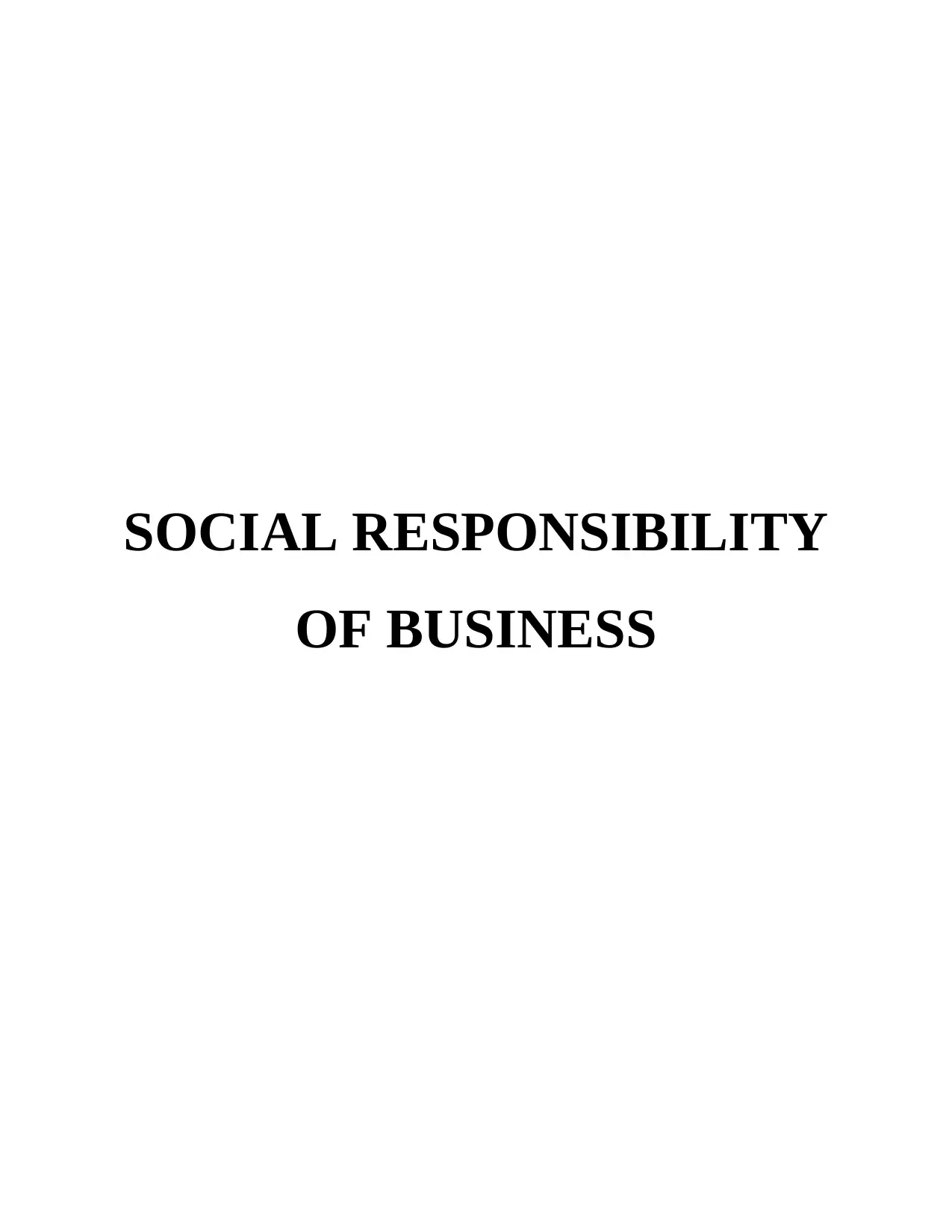
SOCIAL RESPONSIBILITY
OF BUSINESS
OF BUSINESS
Paraphrase This Document
Need a fresh take? Get an instant paraphrase of this document with our AI Paraphraser

TABLE OF CONTENTS
INTRODUCTION...........................................................................................................................1
MAIN BODY..................................................................................................................................1
CONCLUSION................................................................................................................................5
REFERENCES................................................................................................................................6
INTRODUCTION...........................................................................................................................1
MAIN BODY..................................................................................................................................1
CONCLUSION................................................................................................................................5
REFERENCES................................................................................................................................6
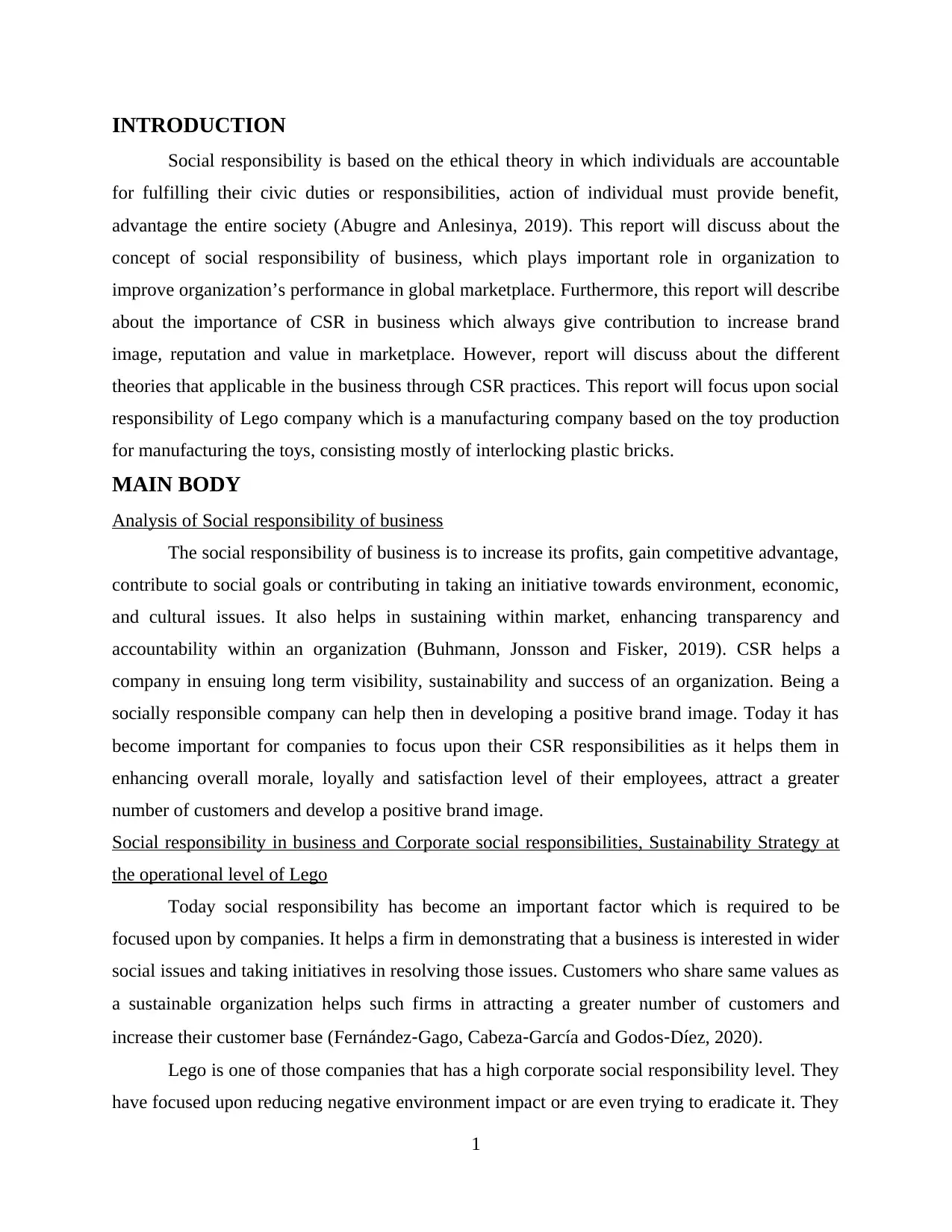
INTRODUCTION
Social responsibility is based on the ethical theory in which individuals are accountable
for fulfilling their civic duties or responsibilities, action of individual must provide benefit,
advantage the entire society (Abugre and Anlesinya, 2019). This report will discuss about the
concept of social responsibility of business, which plays important role in organization to
improve organization’s performance in global marketplace. Furthermore, this report will describe
about the importance of CSR in business which always give contribution to increase brand
image, reputation and value in marketplace. However, report will discuss about the different
theories that applicable in the business through CSR practices. This report will focus upon social
responsibility of Lego company which is a manufacturing company based on the toy production
for manufacturing the toys, consisting mostly of interlocking plastic bricks.
MAIN BODY
Analysis of Social responsibility of business
The social responsibility of business is to increase its profits, gain competitive advantage,
contribute to social goals or contributing in taking an initiative towards environment, economic,
and cultural issues. It also helps in sustaining within market, enhancing transparency and
accountability within an organization (Buhmann, Jonsson and Fisker, 2019). CSR helps a
company in ensuing long term visibility, sustainability and success of an organization. Being a
socially responsible company can help then in developing a positive brand image. Today it has
become important for companies to focus upon their CSR responsibilities as it helps them in
enhancing overall morale, loyally and satisfaction level of their employees, attract a greater
number of customers and develop a positive brand image.
Social responsibility in business and Corporate social responsibilities, Sustainability Strategy at
the operational level of Lego
Today social responsibility has become an important factor which is required to be
focused upon by companies. It helps a firm in demonstrating that a business is interested in wider
social issues and taking initiatives in resolving those issues. Customers who share same values as
a sustainable organization helps such firms in attracting a greater number of customers and
increase their customer base (Fernández‐Gago, Cabeza‐García and Godos‐Díez, 2020).
Lego is one of those companies that has a high corporate social responsibility level. They
have focused upon reducing negative environment impact or are even trying to eradicate it. They
1
Social responsibility is based on the ethical theory in which individuals are accountable
for fulfilling their civic duties or responsibilities, action of individual must provide benefit,
advantage the entire society (Abugre and Anlesinya, 2019). This report will discuss about the
concept of social responsibility of business, which plays important role in organization to
improve organization’s performance in global marketplace. Furthermore, this report will describe
about the importance of CSR in business which always give contribution to increase brand
image, reputation and value in marketplace. However, report will discuss about the different
theories that applicable in the business through CSR practices. This report will focus upon social
responsibility of Lego company which is a manufacturing company based on the toy production
for manufacturing the toys, consisting mostly of interlocking plastic bricks.
MAIN BODY
Analysis of Social responsibility of business
The social responsibility of business is to increase its profits, gain competitive advantage,
contribute to social goals or contributing in taking an initiative towards environment, economic,
and cultural issues. It also helps in sustaining within market, enhancing transparency and
accountability within an organization (Buhmann, Jonsson and Fisker, 2019). CSR helps a
company in ensuing long term visibility, sustainability and success of an organization. Being a
socially responsible company can help then in developing a positive brand image. Today it has
become important for companies to focus upon their CSR responsibilities as it helps them in
enhancing overall morale, loyally and satisfaction level of their employees, attract a greater
number of customers and develop a positive brand image.
Social responsibility in business and Corporate social responsibilities, Sustainability Strategy at
the operational level of Lego
Today social responsibility has become an important factor which is required to be
focused upon by companies. It helps a firm in demonstrating that a business is interested in wider
social issues and taking initiatives in resolving those issues. Customers who share same values as
a sustainable organization helps such firms in attracting a greater number of customers and
increase their customer base (Fernández‐Gago, Cabeza‐García and Godos‐Díez, 2020).
Lego is one of those companies that has a high corporate social responsibility level. They
have focused upon reducing negative environment impact or are even trying to eradicate it. They
1
⊘ This is a preview!⊘
Do you want full access?
Subscribe today to unlock all pages.

Trusted by 1+ million students worldwide
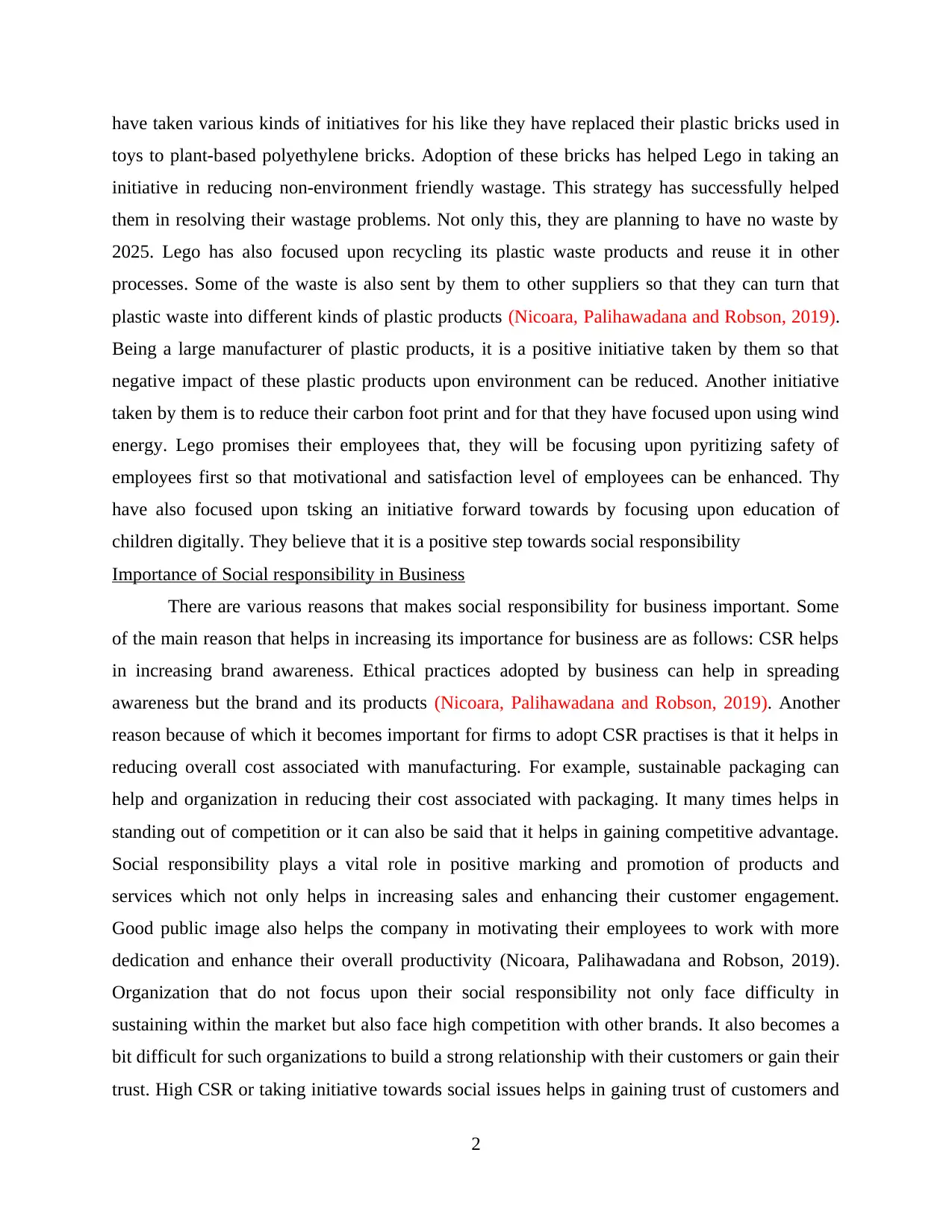
have taken various kinds of initiatives for his like they have replaced their plastic bricks used in
toys to plant-based polyethylene bricks. Adoption of these bricks has helped Lego in taking an
initiative in reducing non-environment friendly wastage. This strategy has successfully helped
them in resolving their wastage problems. Not only this, they are planning to have no waste by
2025. Lego has also focused upon recycling its plastic waste products and reuse it in other
processes. Some of the waste is also sent by them to other suppliers so that they can turn that
plastic waste into different kinds of plastic products (Nicoara, Palihawadana and Robson, 2019).
Being a large manufacturer of plastic products, it is a positive initiative taken by them so that
negative impact of these plastic products upon environment can be reduced. Another initiative
taken by them is to reduce their carbon foot print and for that they have focused upon using wind
energy. Lego promises their employees that, they will be focusing upon pyritizing safety of
employees first so that motivational and satisfaction level of employees can be enhanced. Thy
have also focused upon tsking an initiative forward towards by focusing upon education of
children digitally. They believe that it is a positive step towards social responsibility
Importance of Social responsibility in Business
There are various reasons that makes social responsibility for business important. Some
of the main reason that helps in increasing its importance for business are as follows: CSR helps
in increasing brand awareness. Ethical practices adopted by business can help in spreading
awareness but the brand and its products (Nicoara, Palihawadana and Robson, 2019). Another
reason because of which it becomes important for firms to adopt CSR practises is that it helps in
reducing overall cost associated with manufacturing. For example, sustainable packaging can
help and organization in reducing their cost associated with packaging. It many times helps in
standing out of competition or it can also be said that it helps in gaining competitive advantage.
Social responsibility plays a vital role in positive marking and promotion of products and
services which not only helps in increasing sales and enhancing their customer engagement.
Good public image also helps the company in motivating their employees to work with more
dedication and enhance their overall productivity (Nicoara, Palihawadana and Robson, 2019).
Organization that do not focus upon their social responsibility not only face difficulty in
sustaining within the market but also face high competition with other brands. It also becomes a
bit difficult for such organizations to build a strong relationship with their customers or gain their
trust. High CSR or taking initiative towards social issues helps in gaining trust of customers and
2
toys to plant-based polyethylene bricks. Adoption of these bricks has helped Lego in taking an
initiative in reducing non-environment friendly wastage. This strategy has successfully helped
them in resolving their wastage problems. Not only this, they are planning to have no waste by
2025. Lego has also focused upon recycling its plastic waste products and reuse it in other
processes. Some of the waste is also sent by them to other suppliers so that they can turn that
plastic waste into different kinds of plastic products (Nicoara, Palihawadana and Robson, 2019).
Being a large manufacturer of plastic products, it is a positive initiative taken by them so that
negative impact of these plastic products upon environment can be reduced. Another initiative
taken by them is to reduce their carbon foot print and for that they have focused upon using wind
energy. Lego promises their employees that, they will be focusing upon pyritizing safety of
employees first so that motivational and satisfaction level of employees can be enhanced. Thy
have also focused upon tsking an initiative forward towards by focusing upon education of
children digitally. They believe that it is a positive step towards social responsibility
Importance of Social responsibility in Business
There are various reasons that makes social responsibility for business important. Some
of the main reason that helps in increasing its importance for business are as follows: CSR helps
in increasing brand awareness. Ethical practices adopted by business can help in spreading
awareness but the brand and its products (Nicoara, Palihawadana and Robson, 2019). Another
reason because of which it becomes important for firms to adopt CSR practises is that it helps in
reducing overall cost associated with manufacturing. For example, sustainable packaging can
help and organization in reducing their cost associated with packaging. It many times helps in
standing out of competition or it can also be said that it helps in gaining competitive advantage.
Social responsibility plays a vital role in positive marking and promotion of products and
services which not only helps in increasing sales and enhancing their customer engagement.
Good public image also helps the company in motivating their employees to work with more
dedication and enhance their overall productivity (Nicoara, Palihawadana and Robson, 2019).
Organization that do not focus upon their social responsibility not only face difficulty in
sustaining within the market but also face high competition with other brands. It also becomes a
bit difficult for such organizations to build a strong relationship with their customers or gain their
trust. High CSR or taking initiative towards social issues helps in gaining trust of customers and
2
Paraphrase This Document
Need a fresh take? Get an instant paraphrase of this document with our AI Paraphraser
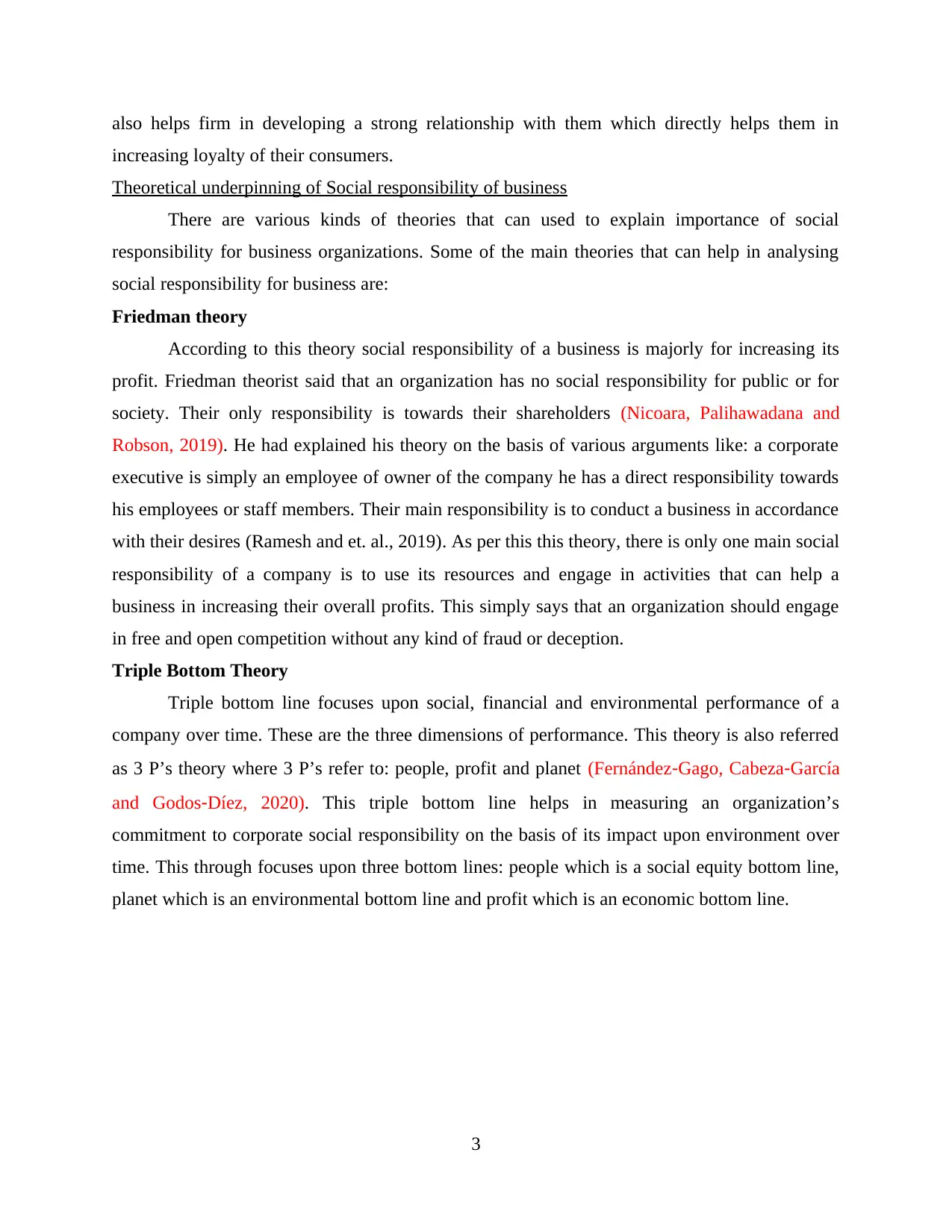
also helps firm in developing a strong relationship with them which directly helps them in
increasing loyalty of their consumers.
Theoretical underpinning of Social responsibility of business
There are various kinds of theories that can used to explain importance of social
responsibility for business organizations. Some of the main theories that can help in analysing
social responsibility for business are:
Friedman theory
According to this theory social responsibility of a business is majorly for increasing its
profit. Friedman theorist said that an organization has no social responsibility for public or for
society. Their only responsibility is towards their shareholders (Nicoara, Palihawadana and
Robson, 2019). He had explained his theory on the basis of various arguments like: a corporate
executive is simply an employee of owner of the company he has a direct responsibility towards
his employees or staff members. Their main responsibility is to conduct a business in accordance
with their desires (Ramesh and et. al., 2019). As per this this theory, there is only one main social
responsibility of a company is to use its resources and engage in activities that can help a
business in increasing their overall profits. This simply says that an organization should engage
in free and open competition without any kind of fraud or deception.
Triple Bottom Theory
Triple bottom line focuses upon social, financial and environmental performance of a
company over time. These are the three dimensions of performance. This theory is also referred
as 3 P’s theory where 3 P’s refer to: people, profit and planet (Fernández‐Gago, Cabeza‐García
and Godos‐Díez, 2020). This triple bottom line helps in measuring an organization’s
commitment to corporate social responsibility on the basis of its impact upon environment over
time. This through focuses upon three bottom lines: people which is a social equity bottom line,
planet which is an environmental bottom line and profit which is an economic bottom line.
3
increasing loyalty of their consumers.
Theoretical underpinning of Social responsibility of business
There are various kinds of theories that can used to explain importance of social
responsibility for business organizations. Some of the main theories that can help in analysing
social responsibility for business are:
Friedman theory
According to this theory social responsibility of a business is majorly for increasing its
profit. Friedman theorist said that an organization has no social responsibility for public or for
society. Their only responsibility is towards their shareholders (Nicoara, Palihawadana and
Robson, 2019). He had explained his theory on the basis of various arguments like: a corporate
executive is simply an employee of owner of the company he has a direct responsibility towards
his employees or staff members. Their main responsibility is to conduct a business in accordance
with their desires (Ramesh and et. al., 2019). As per this this theory, there is only one main social
responsibility of a company is to use its resources and engage in activities that can help a
business in increasing their overall profits. This simply says that an organization should engage
in free and open competition without any kind of fraud or deception.
Triple Bottom Theory
Triple bottom line focuses upon social, financial and environmental performance of a
company over time. These are the three dimensions of performance. This theory is also referred
as 3 P’s theory where 3 P’s refer to: people, profit and planet (Fernández‐Gago, Cabeza‐García
and Godos‐Díez, 2020). This triple bottom line helps in measuring an organization’s
commitment to corporate social responsibility on the basis of its impact upon environment over
time. This through focuses upon three bottom lines: people which is a social equity bottom line,
planet which is an environmental bottom line and profit which is an economic bottom line.
3
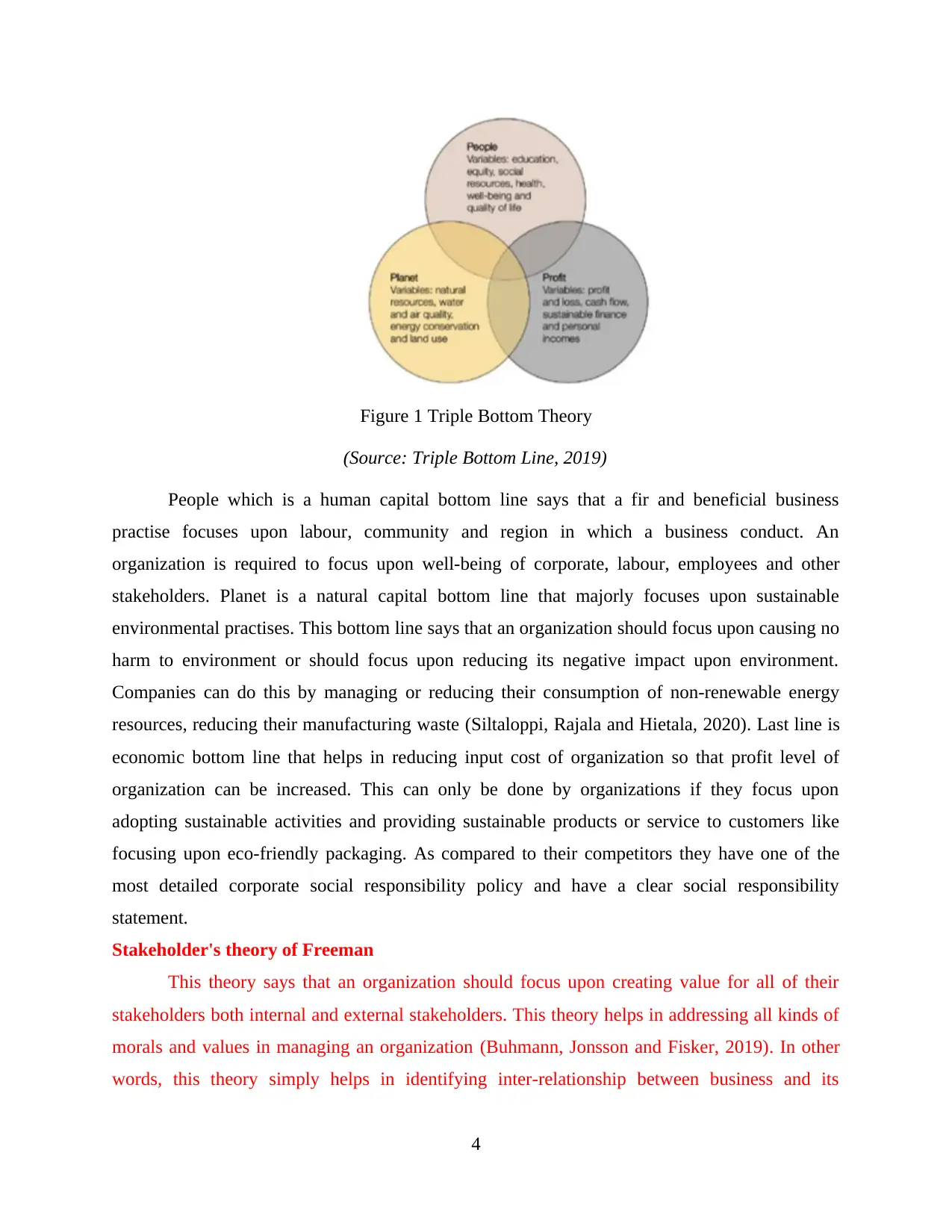
Figure 1 Triple Bottom Theory
(Source: Triple Bottom Line, 2019)
People which is a human capital bottom line says that a fir and beneficial business
practise focuses upon labour, community and region in which a business conduct. An
organization is required to focus upon well-being of corporate, labour, employees and other
stakeholders. Planet is a natural capital bottom line that majorly focuses upon sustainable
environmental practises. This bottom line says that an organization should focus upon causing no
harm to environment or should focus upon reducing its negative impact upon environment.
Companies can do this by managing or reducing their consumption of non-renewable energy
resources, reducing their manufacturing waste (Siltaloppi, Rajala and Hietala, 2020). Last line is
economic bottom line that helps in reducing input cost of organization so that profit level of
organization can be increased. This can only be done by organizations if they focus upon
adopting sustainable activities and providing sustainable products or service to customers like
focusing upon eco-friendly packaging. As compared to their competitors they have one of the
most detailed corporate social responsibility policy and have a clear social responsibility
statement.
Stakeholder's theory of Freeman
This theory says that an organization should focus upon creating value for all of their
stakeholders both internal and external stakeholders. This theory helps in addressing all kinds of
morals and values in managing an organization (Buhmann, Jonsson and Fisker, 2019). In other
words, this theory simply helps in identifying inter-relationship between business and its
4
(Source: Triple Bottom Line, 2019)
People which is a human capital bottom line says that a fir and beneficial business
practise focuses upon labour, community and region in which a business conduct. An
organization is required to focus upon well-being of corporate, labour, employees and other
stakeholders. Planet is a natural capital bottom line that majorly focuses upon sustainable
environmental practises. This bottom line says that an organization should focus upon causing no
harm to environment or should focus upon reducing its negative impact upon environment.
Companies can do this by managing or reducing their consumption of non-renewable energy
resources, reducing their manufacturing waste (Siltaloppi, Rajala and Hietala, 2020). Last line is
economic bottom line that helps in reducing input cost of organization so that profit level of
organization can be increased. This can only be done by organizations if they focus upon
adopting sustainable activities and providing sustainable products or service to customers like
focusing upon eco-friendly packaging. As compared to their competitors they have one of the
most detailed corporate social responsibility policy and have a clear social responsibility
statement.
Stakeholder's theory of Freeman
This theory says that an organization should focus upon creating value for all of their
stakeholders both internal and external stakeholders. This theory helps in addressing all kinds of
morals and values in managing an organization (Buhmann, Jonsson and Fisker, 2019). In other
words, this theory simply helps in identifying inter-relationship between business and its
4
⊘ This is a preview!⊘
Do you want full access?
Subscribe today to unlock all pages.

Trusted by 1+ million students worldwide
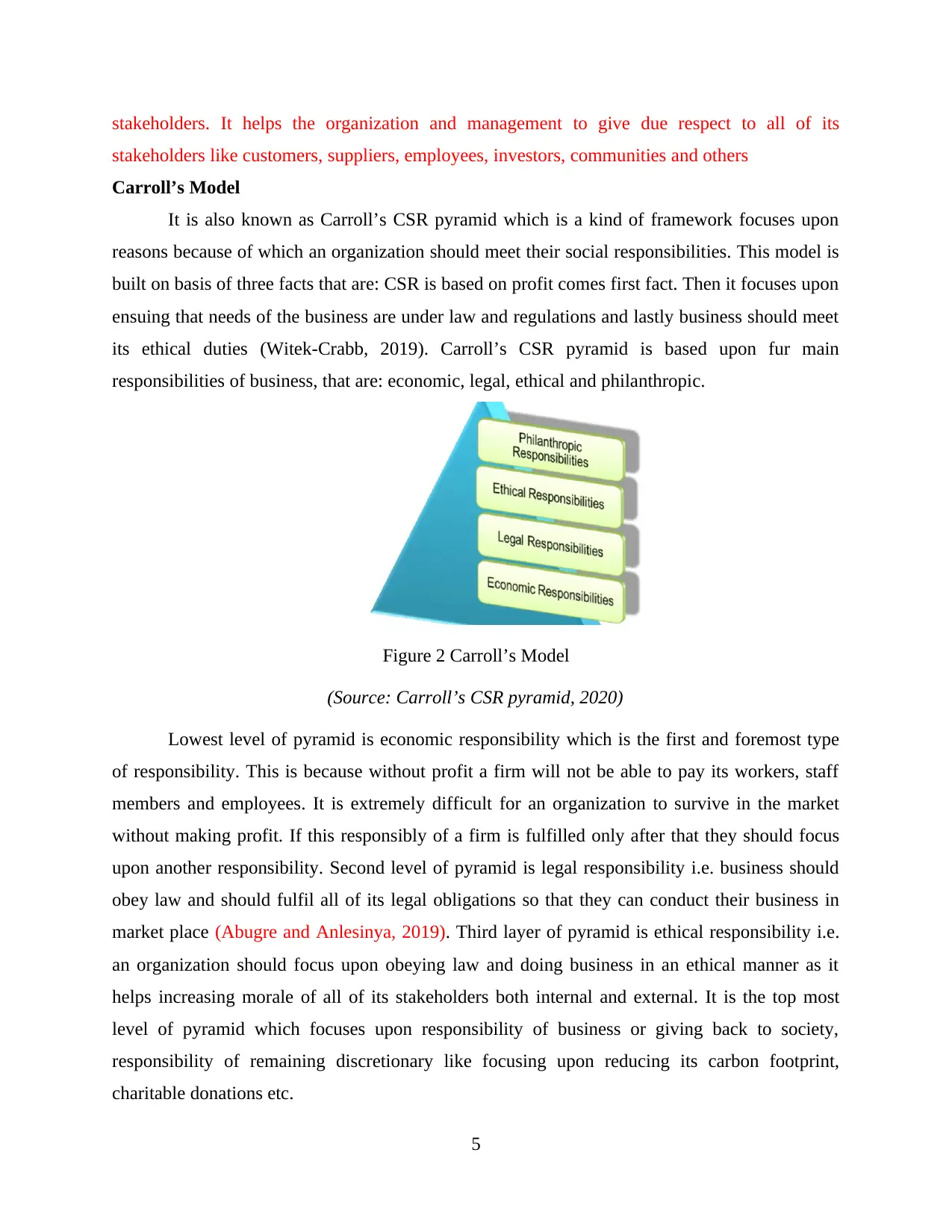
stakeholders. It helps the organization and management to give due respect to all of its
stakeholders like customers, suppliers, employees, investors, communities and others
Carroll’s Model
It is also known as Carroll’s CSR pyramid which is a kind of framework focuses upon
reasons because of which an organization should meet their social responsibilities. This model is
built on basis of three facts that are: CSR is based on profit comes first fact. Then it focuses upon
ensuing that needs of the business are under law and regulations and lastly business should meet
its ethical duties (Witek-Crabb, 2019). Carroll’s CSR pyramid is based upon fur main
responsibilities of business, that are: economic, legal, ethical and philanthropic.
Figure 2 Carroll’s Model
(Source: Carroll’s CSR pyramid, 2020)
Lowest level of pyramid is economic responsibility which is the first and foremost type
of responsibility. This is because without profit a firm will not be able to pay its workers, staff
members and employees. It is extremely difficult for an organization to survive in the market
without making profit. If this responsibly of a firm is fulfilled only after that they should focus
upon another responsibility. Second level of pyramid is legal responsibility i.e. business should
obey law and should fulfil all of its legal obligations so that they can conduct their business in
market place (Abugre and Anlesinya, 2019). Third layer of pyramid is ethical responsibility i.e.
an organization should focus upon obeying law and doing business in an ethical manner as it
helps increasing morale of all of its stakeholders both internal and external. It is the top most
level of pyramid which focuses upon responsibility of business or giving back to society,
responsibility of remaining discretionary like focusing upon reducing its carbon footprint,
charitable donations etc.
5
stakeholders like customers, suppliers, employees, investors, communities and others
Carroll’s Model
It is also known as Carroll’s CSR pyramid which is a kind of framework focuses upon
reasons because of which an organization should meet their social responsibilities. This model is
built on basis of three facts that are: CSR is based on profit comes first fact. Then it focuses upon
ensuing that needs of the business are under law and regulations and lastly business should meet
its ethical duties (Witek-Crabb, 2019). Carroll’s CSR pyramid is based upon fur main
responsibilities of business, that are: economic, legal, ethical and philanthropic.
Figure 2 Carroll’s Model
(Source: Carroll’s CSR pyramid, 2020)
Lowest level of pyramid is economic responsibility which is the first and foremost type
of responsibility. This is because without profit a firm will not be able to pay its workers, staff
members and employees. It is extremely difficult for an organization to survive in the market
without making profit. If this responsibly of a firm is fulfilled only after that they should focus
upon another responsibility. Second level of pyramid is legal responsibility i.e. business should
obey law and should fulfil all of its legal obligations so that they can conduct their business in
market place (Abugre and Anlesinya, 2019). Third layer of pyramid is ethical responsibility i.e.
an organization should focus upon obeying law and doing business in an ethical manner as it
helps increasing morale of all of its stakeholders both internal and external. It is the top most
level of pyramid which focuses upon responsibility of business or giving back to society,
responsibility of remaining discretionary like focusing upon reducing its carbon footprint,
charitable donations etc.
5
Paraphrase This Document
Need a fresh take? Get an instant paraphrase of this document with our AI Paraphraser
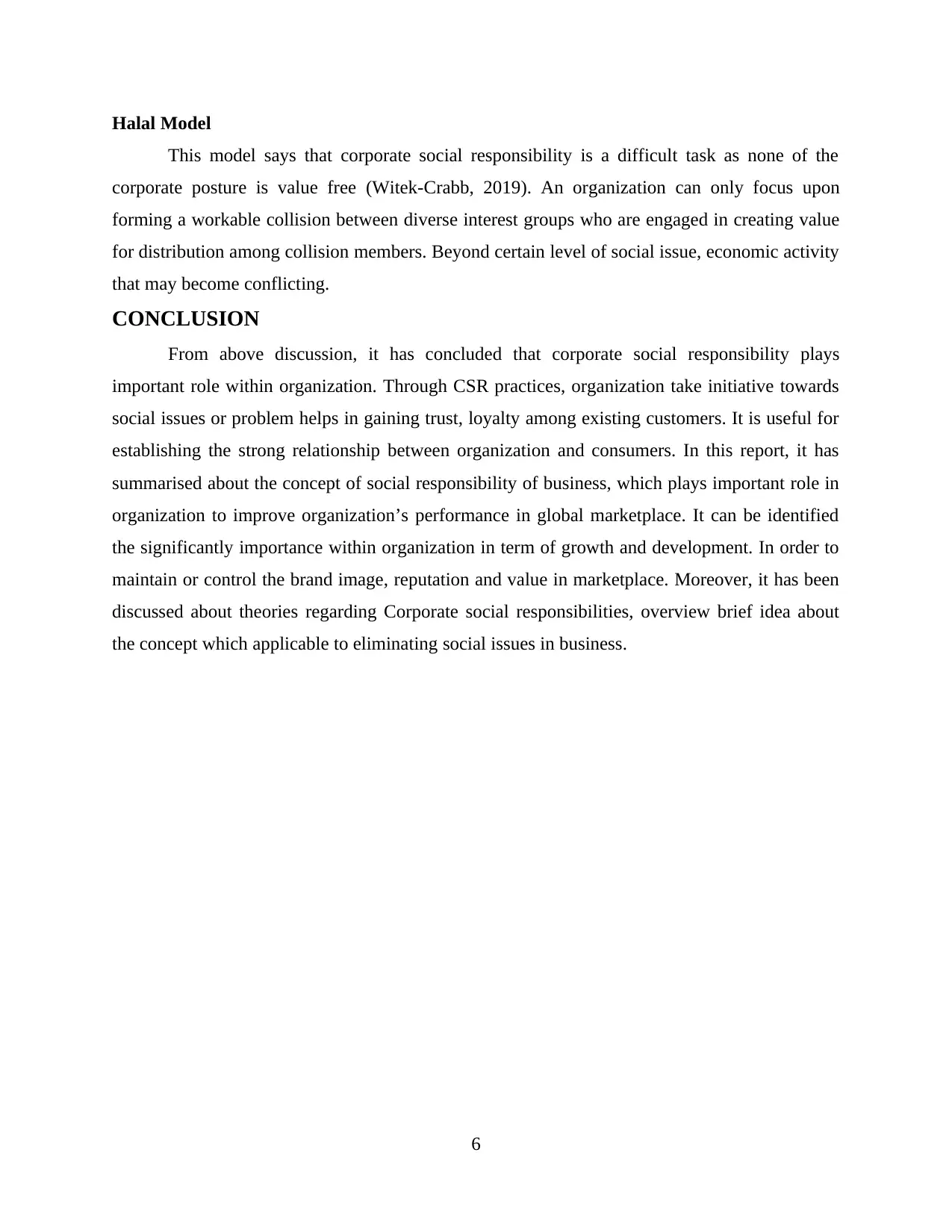
Halal Model
This model says that corporate social responsibility is a difficult task as none of the
corporate posture is value free (Witek-Crabb, 2019). An organization can only focus upon
forming a workable collision between diverse interest groups who are engaged in creating value
for distribution among collision members. Beyond certain level of social issue, economic activity
that may become conflicting.
CONCLUSION
From above discussion, it has concluded that corporate social responsibility plays
important role within organization. Through CSR practices, organization take initiative towards
social issues or problem helps in gaining trust, loyalty among existing customers. It is useful for
establishing the strong relationship between organization and consumers. In this report, it has
summarised about the concept of social responsibility of business, which plays important role in
organization to improve organization’s performance in global marketplace. It can be identified
the significantly importance within organization in term of growth and development. In order to
maintain or control the brand image, reputation and value in marketplace. Moreover, it has been
discussed about theories regarding Corporate social responsibilities, overview brief idea about
the concept which applicable to eliminating social issues in business.
6
This model says that corporate social responsibility is a difficult task as none of the
corporate posture is value free (Witek-Crabb, 2019). An organization can only focus upon
forming a workable collision between diverse interest groups who are engaged in creating value
for distribution among collision members. Beyond certain level of social issue, economic activity
that may become conflicting.
CONCLUSION
From above discussion, it has concluded that corporate social responsibility plays
important role within organization. Through CSR practices, organization take initiative towards
social issues or problem helps in gaining trust, loyalty among existing customers. It is useful for
establishing the strong relationship between organization and consumers. In this report, it has
summarised about the concept of social responsibility of business, which plays important role in
organization to improve organization’s performance in global marketplace. It can be identified
the significantly importance within organization in term of growth and development. In order to
maintain or control the brand image, reputation and value in marketplace. Moreover, it has been
discussed about theories regarding Corporate social responsibilities, overview brief idea about
the concept which applicable to eliminating social issues in business.
6
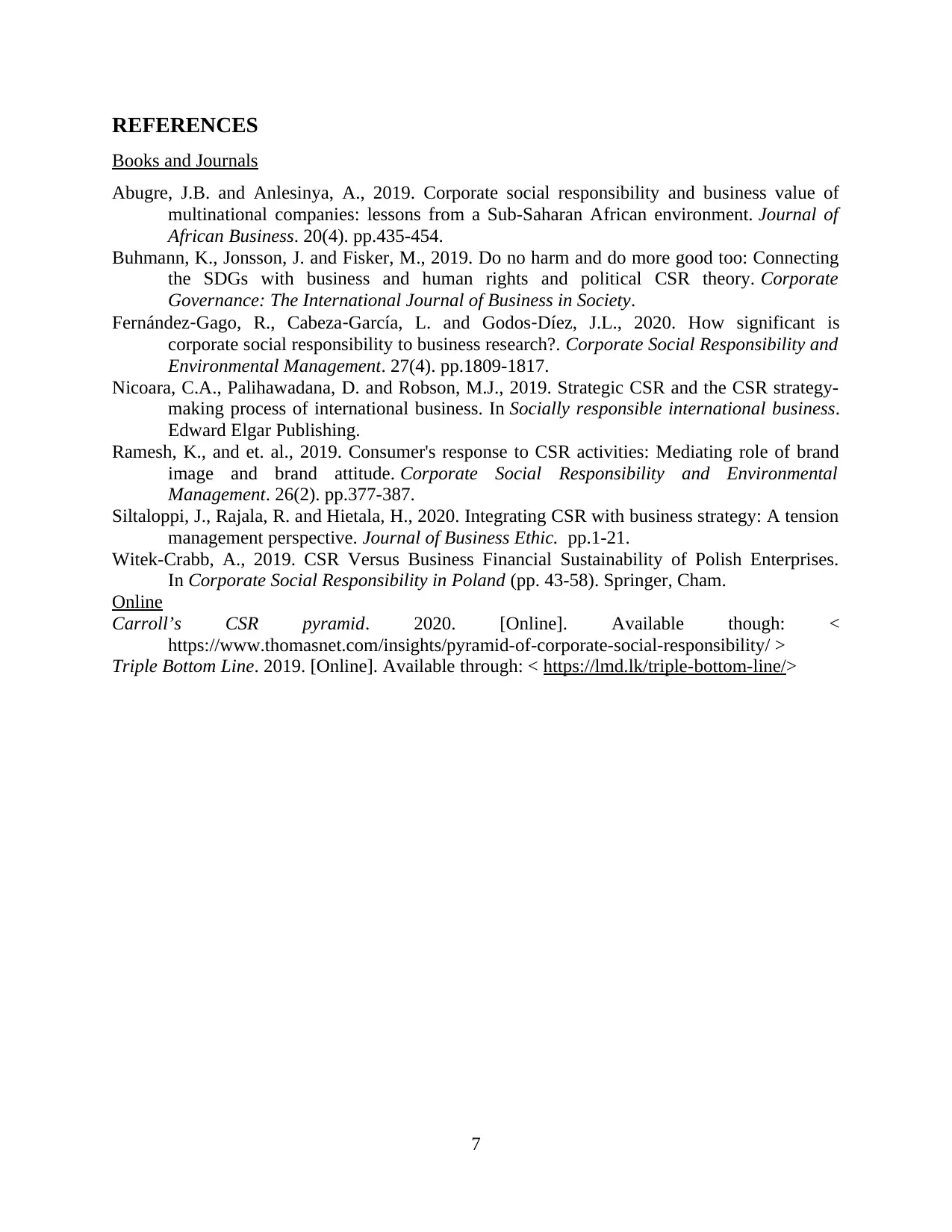
REFERENCES
Books and Journals
Abugre, J.B. and Anlesinya, A., 2019. Corporate social responsibility and business value of
multinational companies: lessons from a Sub-Saharan African environment. Journal of
African Business. 20(4). pp.435-454.
Buhmann, K., Jonsson, J. and Fisker, M., 2019. Do no harm and do more good too: Connecting
the SDGs with business and human rights and political CSR theory. Corporate
Governance: The International Journal of Business in Society.
Fernández‐Gago, R., Cabeza‐García, L. and Godos‐Díez, J.L., 2020. How significant is
corporate social responsibility to business research?. Corporate Social Responsibility and
Environmental Management. 27(4). pp.1809-1817.
Nicoara, C.A., Palihawadana, D. and Robson, M.J., 2019. Strategic CSR and the CSR strategy-
making process of international business. In Socially responsible international business.
Edward Elgar Publishing.
Ramesh, K., and et. al., 2019. Consumer's response to CSR activities: Mediating role of brand
image and brand attitude. Corporate Social Responsibility and Environmental
Management. 26(2). pp.377-387.
Siltaloppi, J., Rajala, R. and Hietala, H., 2020. Integrating CSR with business strategy: A tension
management perspective. Journal of Business Ethic. pp.1-21.
Witek-Crabb, A., 2019. CSR Versus Business Financial Sustainability of Polish Enterprises.
In Corporate Social Responsibility in Poland (pp. 43-58). Springer, Cham.
Online
Carroll’s CSR pyramid. 2020. [Online]. Available though: <
https://www.thomasnet.com/insights/pyramid-of-corporate-social-responsibility/ >
Triple Bottom Line. 2019. [Online]. Available through: < https://lmd.lk/triple-bottom-line/>
7
Books and Journals
Abugre, J.B. and Anlesinya, A., 2019. Corporate social responsibility and business value of
multinational companies: lessons from a Sub-Saharan African environment. Journal of
African Business. 20(4). pp.435-454.
Buhmann, K., Jonsson, J. and Fisker, M., 2019. Do no harm and do more good too: Connecting
the SDGs with business and human rights and political CSR theory. Corporate
Governance: The International Journal of Business in Society.
Fernández‐Gago, R., Cabeza‐García, L. and Godos‐Díez, J.L., 2020. How significant is
corporate social responsibility to business research?. Corporate Social Responsibility and
Environmental Management. 27(4). pp.1809-1817.
Nicoara, C.A., Palihawadana, D. and Robson, M.J., 2019. Strategic CSR and the CSR strategy-
making process of international business. In Socially responsible international business.
Edward Elgar Publishing.
Ramesh, K., and et. al., 2019. Consumer's response to CSR activities: Mediating role of brand
image and brand attitude. Corporate Social Responsibility and Environmental
Management. 26(2). pp.377-387.
Siltaloppi, J., Rajala, R. and Hietala, H., 2020. Integrating CSR with business strategy: A tension
management perspective. Journal of Business Ethic. pp.1-21.
Witek-Crabb, A., 2019. CSR Versus Business Financial Sustainability of Polish Enterprises.
In Corporate Social Responsibility in Poland (pp. 43-58). Springer, Cham.
Online
Carroll’s CSR pyramid. 2020. [Online]. Available though: <
https://www.thomasnet.com/insights/pyramid-of-corporate-social-responsibility/ >
Triple Bottom Line. 2019. [Online]. Available through: < https://lmd.lk/triple-bottom-line/>
7
⊘ This is a preview!⊘
Do you want full access?
Subscribe today to unlock all pages.

Trusted by 1+ million students worldwide
1 out of 9
Related Documents
Your All-in-One AI-Powered Toolkit for Academic Success.
+13062052269
info@desklib.com
Available 24*7 on WhatsApp / Email
![[object Object]](/_next/static/media/star-bottom.7253800d.svg)
Unlock your academic potential
Copyright © 2020–2026 A2Z Services. All Rights Reserved. Developed and managed by ZUCOL.




